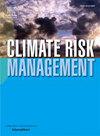The role of gender in firm-level climate change adaptation behaviour: Insights from small businesses in Senegal and Kenya
IF 5
2区 环境科学与生态学
Q1 ENVIRONMENTAL SCIENCES
引用次数: 0
Abstract
Literature on gender and climate change adaptation tends to propose that women are both especially vulnerable to climate change and especially valuable to climate change adaptation, but these ideas have been little considered in the context of adaptation within small businesses and have rarely been tested through quantitative empirical analysis. This paper responds to this gap within existing literature and explores how female representation in the ownership or management structures of micro and small businesses shapes firm-level adaptive capacity, as implied through adaptation behaviour. Using firm-level survey data from semi-arid regions of Senegal and Kenya, we employ a Poisson regression model to empirically investigate how female representation in ownership and management of micro and small businesses affects adoption of firm-level sustainable and unsustainable adaptation strategies, with increasing exposure to extreme weather events. Our results show that businesses with female leadership that faced a larger number of extreme events adopt more sustainable and fewer unsustainable strategies than those with only male leadership. We interpret this result recognising that unsustainable adaptation strategies, such as selling business assets, require a business to have access to business assets and resources and thus are an outcome of a business’ coping capacity. Consistent with literature, we then identify that adaptation assistance can mitigate some of the harmful effects of climate shocks and additionally support micro and small businesses with female leadership to adopt more adaptation strategies (both sustainable and unsustainable) – and to a greater extent than businesses with only male leadership. Results evidence the value and efficiency of developing an inclusive business enabling environment for adaptation that targets women entrepreneurs, not just for delivering on equitable climate justice agendas, but also for strategic upscaling of resilience.
性别在企业层面气候变化适应行为中的作用:来自塞内加尔和肯尼亚小企业的见解
关于性别与气候变化适应的文献倾向于提出,女性对气候变化特别脆弱,对气候变化适应也特别有价值,但这些观点在小企业适应的背景下很少得到考虑,也很少通过定量实证分析进行检验。本文回应了现有文献中的这一差距,并探讨了女性在微型和小型企业的所有权或管理结构中的代表性如何通过适应行为暗示公司层面的适应能力。利用来自塞内加尔和肯尼亚半干旱地区的企业层面调查数据,我们采用了Poisson回归模型,实证研究了随着极端天气事件的增加,女性在微型和小型企业所有权和管理中的代表性如何影响企业层面采用可持续和不可持续的适应策略。我们的研究结果表明,与只有男性领导的企业相比,女性领导的企业面临更多极端事件,采取的可持续战略更多,不可持续战略更少。我们对这一结果的解释是,不可持续的适应战略,如出售商业资产,要求企业能够获得商业资产和资源,因此是企业应对能力的结果。与文献一致,我们发现适应援助可以减轻气候冲击的一些有害影响,并额外支持女性领导的微型和小型企业采取更多的适应战略(可持续和不可持续)-并且在更大程度上比只有男性领导的企业。研究结果表明,为适应气候变化打造一个以女性企业家为目标的包容性商业环境具有价值和效率,不仅有助于实现公平的气候正义议程,还有助于战略性地提升适应能力。
本文章由计算机程序翻译,如有差异,请以英文原文为准。
求助全文
约1分钟内获得全文
求助全文
来源期刊

Climate Risk Management
Earth and Planetary Sciences-Atmospheric Science
CiteScore
8.20
自引率
4.50%
发文量
76
审稿时长
30 weeks
期刊介绍:
Climate Risk Management publishes original scientific contributions, state-of-the-art reviews and reports of practical experience on the use of knowledge and information regarding the consequences of climate variability and climate change in decision and policy making on climate change responses from the near- to long-term.
The concept of climate risk management refers to activities and methods that are used by individuals, organizations, and institutions to facilitate climate-resilient decision-making. Its objective is to promote sustainable development by maximizing the beneficial impacts of climate change responses and minimizing negative impacts across the full spectrum of geographies and sectors that are potentially affected by the changing climate.
 求助内容:
求助内容: 应助结果提醒方式:
应助结果提醒方式:


